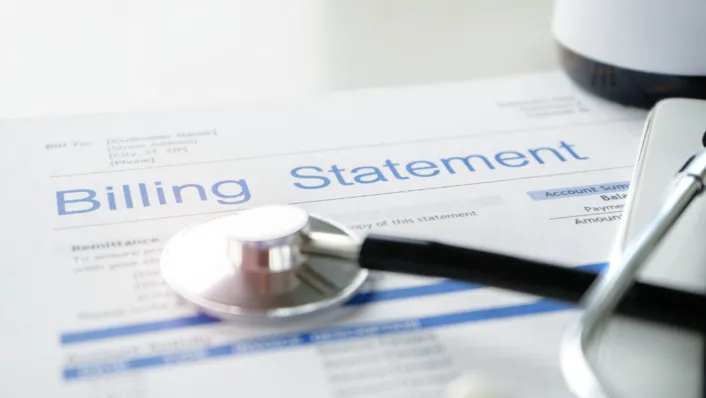After visiting the doctor or hospital, you may find you owe a substantial amount of money. Now, you may be looking for a medical debt payoff plan.
This can be a stressful situation for many people, but knowing what to expect and how to manage medical debt can make dealing with this challenging scenario less overwhelming.
If you’re in this situation and trying to figure out how paying off medical debt will ever happen, you aren’t alone. A recent study found that one in three Americans report having medical debt that they are unable to pay. Unpaid medical bills can be detrimental to your credit score and financial security. Even if you have insurance, it doesn’t mean you won’t end up with bills afterward.
Unexpected bills can have a big impact on your overall picture and peace of mind. Do you know what to do when hit with unforeseen expenses? If not…don’t panic. Here, we’ll cover everything you need to know about managing medical debt and how to resolve it as quickly as possible.
What is medical debt?
Medical debt is any debt that you incur from diagnostic services or treatment received from a doctor or other medical provider. Coping with medical debt is different from other financial obligations because it isn’t something you necessarily “signed up” for. If you take out a loan to start a business or make repairs to your home, you knew you were taking on debt. With medical debt, you likely received services and weren’t expecting to be hit with a huge bill. Medical debt can come from any number of places, such as doctor visits, prescription drug costs, or treatments at a hospital. Other times, it can arise when a medical provider bills insurance companies for the services you received and ends up getting less than what was billed.
Medical expenses are an important part of your financial wellness picture, but when you or a loved one are sick, cost is usually the last thing on your mind.
According to a Harvard University study, medical expenses are the leading cause of bankruptcy in the United States. About 62% of bankruptcies are attributed to medical debt. Even people with health insurance can find themselves facing challenges due to medical expenses. 72% of people who file for bankruptcy due to medical bills have health insurance.
How common is medical debt?
Medical debt is extremely common. A recent study found nearly one half of Americans report having difficulty affording health care costs and approximately one in three say they are overwhelmed trying to pay off past-due medical bills. Medical debt is also extremely common among certain groups and paying off medical debt can be even more of a challenge for those individuals. For example, people with disabilities, low-income individuals, and minorities are more likely to end up with medical debt. In fact, research suggests that people with disabilities have more than twice the amount of medical debt compared to people without disabilities. This is unfortunate because many people are unable to work and earn an income due to their disabilities. This makes it even more difficult to pay off past-due medical bills.
How is medical debt different from other debt?
Medical debt is different because it’s not just a number on your credit report. It’s something that can affect you and your future. In addition to sinking your credit scores and making it harder to get loans in the future, unpaid medical bills may also prevent you from getting certain jobs, renting an apartment, or even traveling abroad. There are also unique ways that medical debt differs from other types of debt. If you have outstanding medical bills that have gone to collections, there are things you can do about it.
GreenPath Financial Service
GreenPath, A Financial Resource
If you’re interested in building healthy financial habits, paying down debt, or saving for what matters most, take a look at these free financial tools.
What happens if I don’t pay my medical debt?
If you have a medical bill that you can’t pay, your first instinct may be to ignore it. However, ignoring the bill won’t make it go away. If you fail to pay your medical debt and don’t work with the hospital or doctor to set up a payment plan, you may face serious consequences like negative impact on your credit.
If you have unpaid medical debt, the best thing that you can do is work with the medical provider to set up a payment plan. You can also ask the collections agency to put you on a payment plan, or try to negotiate a payment arrangement with the hospital or doctor’s office directly. If you need help getting a handle on your debt, reach out to GreenPath. We offer counseling, budget plan assistance, and other helpful tools.
What recent regulations impact medical debt and credit history?
In March 2022 the federal government moved to help limit the impact unpaid medical debt has on consumers. The plan came several weeks after the three biggest credit reporting firms announced they will soon limit the inclusion of such debt on a credit report. As of July 1st of this year, paid medical collection debt — those bills turned over to a collection agency that are eventually taken care of — will no longer appear on a consumer credit report. Also, starting next year, debt that’s under $500 won’t show up at all. Consumers will now have a full year to figure out insurance or billing issues before unpaid medical debt is reported on their credit files, affecting their credit scores.
How does medical debt affect your credit score?
Medical debt can have a significant impact on your credit score. It is different from other types of debt because it can be both positive and negative for your credit score. This might sound counterintuitive, but the fact you have a payment plan in place (even if it’s just making minimum payments) can help your credit score. Typically, it has a higher impact than other types of debt, such as credit card debt. Medical debt can have a greater impact on your credit score for several reasons. One reason is that it is typically larger than other types of debt, so it has a greater effect on your overall credit utilization. Another reason is because it tends to be aged longer, which has a greater impact on your credit score.
How can I pay off medical debt?
Medical debt can be challenging to pay off, especially if you have other monthly expenses to cover. Past-due medical bills can be another item on your debt list you need to account for and work to pay off.
One way you can tackle your medical debt is by enrolling in a payment plan with your medical provider. This way, your medical debt payoff will be easier to manage. You can also talk to your provider about any government programs that might help you pay off your medical debt. You can also explore other options to settle the debt. You may also be able to deduct medical expenses if they are more than 10% of your income.
What steps can I take to address past-due medical debt?
If you have past-due medical debt, you’ll want to take action to get it resolved as soon as possible. Here are a few steps you can take to address the debt. First, you’ll want to make sure it’s actually past due. This may seem obvious, but many people who have medical debt don’t know exactly how much they owe or to whom they owe it.
- Take Inventory – It’s always a good idea to fully understand where you currently stand financially. What exactly do you owe? In the same way that you cannot ignore personal debts, thinking they will magically go away, you have to face your medical debt head-on.
- Understand Your Insurance Coverage – Make sure you understand what your insurance covers and what it doesn’t.
- Get Help, When You Need It – Understanding how to manage expenses like medical costs and loans starts with a conversation. GreenPath financial counselors are available to talk. They can help you figure out a plan and will walk through your complete financial picture to help you understand the best way to manage your debt. It’s likely medical debt is only one part of your financial situation. Trusted counselors take the time to explore how other debt (such as credit cards, housing costs, and other financial obligations) impacts your ability to manage medical debt. Call GreenPath at (888)368-1970.
- Be Proactive about Medical Debt – While there are times when unexpected health issues seem to pop up out of nowhere, do everything you can to take care of yourself. It’s easier to stay healthy than get healthy. When a health issue arises and you incur debt, be proactive about taking care of what you owe.
- Verify You Owe the Debt – With any debtor, there can be errors that end up on your credit reports. Make sure any debt is actually valid and correct – mistakes can happen with medical debt as well. As you begin to activate your medical debt payoff plan, make sure the debt you are being contacted about is accurate as reported. Take action on this debt and work quickly to resolve or dispute inaccurate charges.
- Don’t Ignore Medical Debt – Paying off medical debt is important and not addressing it can hurt your credit score for a long time. If you can’t afford to pay off all your debt and hesitate to contact your creditors directly, you can contact a trusted resource like GreenPath.
Coping with medical debt can be a challenge, especially if you don’t have a clear idea of what to do next. Remember you are not alone and don’t have to figure it all out today. Past-due medical bills can delay you reaching your financial goals. Fortunately, there are ways to create a plan for medical debt payoff that will put you in a better position financially.
To recap…It’s important to first understand what medical debt is, how it is different from other types of debt, and how it impacts your credit score. It is always key to eliminate it as soon as possible. This includes taking action to address past due medical debt, resolving any errors on your credit report, and executing on a plan to pay off your medical debt.
You can begin where you are, getting the advice you need. It is as close as a phone call to GreenPath financial services.










